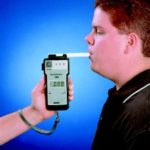 In Florida, if you are stopped and arrested for DUI, you will have to submit to a sobriety test, unless you are willing to forfeit your driver’s license for a year. A police officer may perform this test in one of three ways, a blood test, a urine test, or a breathalyzer. While the blood test is the most accurate, it is also the most invasive and requires a clinical setting to be performed. In the majority of Florida DUI stops, a breathalyzer is administered. There are strict requirements for the breathalyzer to be performed properly. 1)20 Minute Rule-the breath test operator, agency inspector, arresting officer, or person designated by the permit holder shall reasonably ensure that the subject has not taken anything by mouth or has not regurgitated for at least twenty (20) minutes before administering the test. 2)Two Breath Tests-two breath samples must be taken from the suspect and they must be conducted within 15 minutes of each other.
In Florida, if you are stopped and arrested for DUI, you will have to submit to a sobriety test, unless you are willing to forfeit your driver’s license for a year. A police officer may perform this test in one of three ways, a blood test, a urine test, or a breathalyzer. While the blood test is the most accurate, it is also the most invasive and requires a clinical setting to be performed. In the majority of Florida DUI stops, a breathalyzer is administered. There are strict requirements for the breathalyzer to be performed properly. 1)20 Minute Rule-the breath test operator, agency inspector, arresting officer, or person designated by the permit holder shall reasonably ensure that the subject has not taken anything by mouth or has not regurgitated for at least twenty (20) minutes before administering the test. 2)Two Breath Tests-two breath samples must be taken from the suspect and they must be conducted within 15 minutes of each other.
Additionally, the breathalyzer must be administered by someone who is certified to conduct a breathalyzer. The machine must be approved by the State of Florida and calibrated, tested, and inspected on a periodic basis.
There are other factors that may affect the reliability and accuracy of the breathalyzer test. These include foreign substances (even mouthwash can alter the test), the breathalyzer software, and environmental factors such as the presence of paint fumes, varnish, and chemicals such as plastics and adhesives.
Dr. Michael Hiastala, Professor of Physiology, Biophysics and Medicine at the University of Washington:
Breath testing, as currently used, is a very inaccurate method for measuring BAC. Even if the breath testing instrument is working perfectly, physiological variables prevent any reasonable accuracy…. Breath testing for alcohol using a single test method should not be used for scientific, medical or legal purposes where accuracy is important.
When freedom and ability to drive is on the line because you’ve been arrested for DUI, don’t assume the breathalyzer gave an accurate picture of your actual blood alcohol level. There is sufficient scientific evidence to show this form of DUI testing is unreliable and unfair to the driver.
